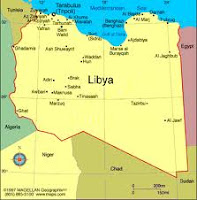Libya Imposes Visas On Mauritanians, Algerians
Algerian and Mauritanian nationals no longer have unrestricted entry to Libya. The National Transitional Council (NTC) removed citizens of the two countries from the list of states that enjoyed visa exemptions under the former regime, Algeria’s Echorouk reported recently.
Less than two weeks later, the Mauritanian government recognised the NTC. The decision came “in view of the formation of the new Libyan government under Dr Abdurrahim El Keib”, the government said in a November 24th statement.
Mauritania announced “its support for the development and building efforts in that brotherly country, and its full preparedness to work side by side with the new Libyan government in enhancing co-operation and partnership between the two countries, to start a new beginning of joint Maghreb action”.
Only Tunisians remain exempt from visa requirements.
Practical instructions were issued to customs authorities to “start withdrawing a number of Arab countries” that could freely enter Libya without obtaining visas from Libyan embassies, Echourouk reported November 12th. Syrian and Egyptian nationals are also subject to visa regulations.
The restrictions have already come into force. According to Mauritania’s aqlame.com, Royal Air Maroc refused to carry Mauritanian nationals to Libya two weeks ago “under the pretext that it had orders from its central administration not to carry Mauritanians to Libya without entry visas”.
“Ambiguity in this issue is causing us a lot of confusion and embarrassment with our clients,” the site cited Mauritanian travel agents as saying. “The Libyan embassy in Nouakchott is saying that it doesn’t have information about imposing a visa requirement on Mauritanians going to Libya. Tunis Air accepts to carry Mauritanians while Royal Air Maroc says that it has instructions not to carry them without visas.”
The new rules will particularly impact students pursuing their degrees in Libya.
“I returned to Mauritania when the Libyan crisis broke out,” medical student Mohamed Ali Ould Ahmed told Magharebia. “I have a strong desire to return to Libya to complete my studies. In the new Libya, I hope to see an atmosphere of acceptance of brothers from neighbouring countries.”
Meanwhile, political observers warn that visa restrictions could endanger the prospects of building a united Maghreb.
“It’s not in the interest of Libya’s government to disturb the Maghreb Union atmosphere because it will be disastrous to its relations with Arab and Maghreb countries at a time when Algeria and Morocco are trying to overcome the difficulties that have always been seen as an obstacle impeding the Maghreb unity because of the Western Sahara problem,” Mauritanian analyst Didi Ould Lemrabet said.
“Maghreb peoples seek to repair the relations of their countries after Kadhafi’s death,” he added.
The announcement came amid renewed efforts to mend Algerian-Moroccan ties and accelerate action on the Arab Maghreb Union (UMA). “Very soon, we will find the path that leads us to something we all dream of, not only bilateral relations between Algeria and Morocco, but also this ambition we have for the Maghreb,” Algerian Foreign Minister Mourad Medelci said after speaking with his Moroccan counterpart Taieb Fassi Fihri on the side-lines of the Arab-Turkish Co-Operation Forum. They agreed that it was “urgent” to convene the Council of Ministers of the Arab Maghreb Union to discuss co-operation and integration of the Maghreb, Algerian Foreign Ministry spokesman Amar Belani said.
Magharebia, 1/12/2011



